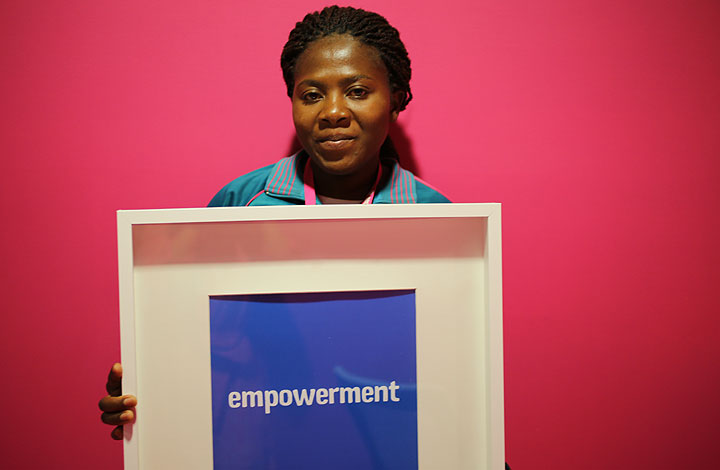TORONTO – Mary Taedzerwa said she was only a teen when she was “forced out” of her family home.

“My relationship with my family wasn’t the best,” she said in an interview with Global News. “I was poor. I had no education and no resources of my own.”
The Zimbabwe native said was kicked out of the house after coming home late one night. She said she felt she had “no choice” but to move in with her then-boyfriend, Dixon.
Shortly after, the two got married. Taedzerwa was only 15 years old.
READ MORE: Will spoons hidden in underwear help stop forced marriages in Britain?
The physical abuse reportedly continued even when Taedzerwa was pregnant. After four years of marriage and three children later, at 19 years old she left her husband.
“No one helped me [when I left],” she said. “I was by myself. I didn’t go to school. I had to time to be with the kids. I was busy being a mother.”
A newly released report from Plan Canada — Pathways to Power: Creating Sustainable Change for Adolescent Girls — highlights how millions of girls in developing countries are robbed of their power through child, early and forced marriages.
According to a 2012 United Nations study, one in three girls in the developing world will be married by her 18th birthday–that’s 14 million per year or nearly 39,000 girls every day.
‘This should make Canadians angry’
Taedzerwa, now 28, said she shares her story to advocate against the practice of child, early and forced marriages.
“I want to help other girls who might be a similar situation,” she said. “I would tell them to go school. You become powerless if you don’t get any education.”
Sarah Hendriks, a global gender equality and inclusion advisor for Plan International, said child marriage is a huge trigger point for negative outcomes.
“It forces girls out of education and provides them with extremely poor prospects and put them at a much greater risk of violence and abuse,” she said.
In a recent global survey and report, many girls in developing countries said feel they do not have power to make decisions about when to get married or have a child.
“This should make Canadians angry at the injustice of child marriage,” said Hendriks.
Is Canada doing enough?
In October 2013, Foreign Affairs Minister John Baird announced Canada’s introduction of the first-ever stand-alone resolution at the United Nations General Assembly on child, early and forced marriage.
“Canada has had an interesting and strong leadership when it comes to battling forced marriage,” said Hendriks.
According to Hendriks, Canada has invested in innovative and result-based programs in some of the countries that are the hardest hit in hopes of changing social norms and attitudes about early, child and forced marriages in households and communities.
Baird’s announcement last year also included a pledge of $5 million toward engaging with communities in countries where the practice was the most common, such as Afghanistan, Ethiopia, Ghana, Somalia and Zimbabwe.
Hendriks said that although Canada continues to be committed and acting as a leader when it comes to providing education programs aimed at young girls and maternal health, a plan is needed that would help advocates better understand the laws and policies that are in place in countries that prohibit or perpetuate child, early and forced marriages.
“We need help to understand how counties are dealing with this issue,” she said. “Despite laws in countries that prohibit this practice, child marriages still occur and rob girls of their childhood.”
In Zimbawbe, for example, child, early and forced marriages are illegal — yet an estimated 34 per cent of girls will be married by the time they are 18 years old.
“Girls are often married off early for religious, cultural and economic reasons,” said Hendricks. “It’s time for us to change the attitudes at the community level.”
Not just a problem in developing nations
Hendricks said that child, early and forced marriages occur in many places in western Europe and North America—not just in the poorest countries in the world.
- Canadian man dies during Texas Ironman event. His widow wants answers as to why
- ‘Shock and disbelief’ after Manitoba school trustee’s Indigenous comments
- Canadian food banks are on the brink: ‘This is not a sustainable situation’
- Invasive strep: ‘Don’t wait’ to seek care, N.S. woman warns on long road to recovery
According to a 2013 report by the South Asian Legal Clinic of Ontario, 219 reported cases of forced marriage occurred between 2010 and 2012, with 97 per cent of the victims being women. And those were just numbers for the province of Ontario.
A 2014 study said the incident rates of forced marriage specifically in Canada are unknown as the issue is “a little known, complex and largely unreported reality in Canada mainly because it is often shrouded in a wall of silence.”
On Wednesday, Ottawa announced legislation to ban people in polygamous and forced marriages from immigrating to Canada.
READ MORE: Feds to ban ‘barbaric’ cultural practices
“Canadians should care because of the sheer scope of the issue,” said Hendricks. “Early marriage is where opportunity in life really closes in on a girl and the issue of poverty transfers from one generation to the next.”
Taedzerwa said it’s because of programs offered though Plan International and other educational community organizations that she is now running a profitable business buying and selling clothes and other items in her community in Zimbabwe.
“Getting an education and access to these programs is important because you get access to opportunities that you otherwise would not get.”




Comments